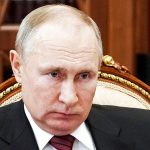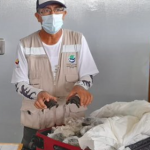President Joe Biden has said he thinks Russia will mount an attack on Ukraine.
Speaking at a news conference marking a year in office, the US President suggested there was an inevitability about Russian President Vladimir Putin’s actions.
“My guess is he will move in; he has to do something,” Joe Biden said.
“Do I think he’ll test the West, test the United States and NATO? Yes. As significantly as he can? Yes, I think he will,” he said.
“But I think he’ll pay a serious and dear price for it that he doesn’t think now will cost him. And I think he will regret having done it.”
Please use Chrome browser for a more accessible video player
Smaller incursion may not prompt massive sanctions
The comments are his first since last week’s marathon round of diplomacy with Russia faltered.
Russia-Ukraine tensions: Skilful creative diplomacy needed during week of high-stakes talks
Joe Biden says Donald Trump spread ‘web of lies’ about 2020 US election as he condemns political violence one year since US Capitol riots
Vladimir Putin warns Joe Biden it would be a mistake to impose new sanctions on Russia over Ukraine
And pressed on whether sanctions will work to deter Russia from invading, the President offered a distinction between an invasion and an incursion, appearing to infer that a smaller incursion would not prompt massive sanctions.
“Russia will be held accountable if it invades. And it depends on what it does. It’s one thing if it’s a minor incursion and we end up having a fight about what to do and not do etc, but if they actually do what they are capable of doing with the forces that are massed on the border, it is going to be a disaster for Russia,” he said.
He was offered the chance to clarify whether he was suggesting that an incursion would prompt a lesser Western response.
“So the question is if it’s something significantly short of a significant invasion, or not even significant, just major military forces coming across. For example, it’s one thing to determine that if they continue to use cyber efforts, well we can respond the same way, with cyber,” he said.
US correspondent
Sometimes ambiguity is a tool of diplomacy. But often, it’s actually clear language that is vital.
At the White House, the President made ambiguous comments which have rattled Kyiv and potentially presented Moscow with an opportunity.
President Biden inferred that a Russian incursion might not prompt the same response as an invasion. He failed clearly to outline what his definition of incursion was.
It was left to a White House spokesperson to clarify that he was drawing a distinction between ‘military’ and ‘para-miliary’.
Remember, when Russia invaded and then annexed Ukraine’s Crimea peninsula in 2014 it did so with Russian troops who wore no insignia – the so-called ‘little green men’. Para-military?
On Friday, I sat down with Victoria Nuland, America’s Under-Secretary of State for Political Affairs and former US ambassador to NATO and asked her if there was a distinction.
“Further territorial aggression against Ukraine, further efforts that would destabilise a democratically elected government, any of these sabotage plots brought to Ukraine by Russia are aggressive, are destabilising and will result in firm and swift action from us. We have said that the response will be severe economic and political consequences,” she said.
It is clear from what President Biden said that NATO remains split over its Ukraine response.
Something less than a full-scale invasion will, as Joe Biden admitted, “…cause a fight about what to do and what not to do”.
So if President Putin does decide to annex another small part of Ukraine, perhaps using “little green men”, might he just think he’ll get away with it?
‘Actions would be met by a reciprocal response’
White House staff later clarified his comments, saying that the President was distinguishing between military and non-military or para-military.
Emily Horne, spokesperson for the White House National Security Council tweeted: “He was referring to the difference between military and non-military / para-military / cyber action by the Russians. Such actions would be met by a reciprocal response, in coordination with Allies and partners.”
Biden issues warning
President Biden concluded his Ukraine comments in the news conference with a warning.
“We need to be very careful about how we move forward and make it clear to him that there are prices to pay that could in fact cost his country an awful lot,” the President said.
With stark language, he added: “Of course you have to be concerned when you have, you know, a nuclear power invade. If he invades, this hasn’t happened since World War Two.
“This’ll be the most consequential thing that’s happened in the world in terms of war and peace since World War Two.”
Equally stark, in a comment that might be lost in one of the longest news conferences in presidential history, Mr Biden questioned whether anyone even within the Kremlin had any idea of Putin’s plan.
“There is a question about whether the people [we] are talking to [Russian diplomats] know what he [Putin] is going to do.”






















